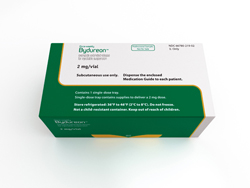 |
| Bydureon--Courtesy of AstraZeneca |
With big money to be made, drugmakers have responded to the global rise in Type 2 diabetes with a host of new classes of treatments that work in different ways. And while that is generally a good thing, the full range of adverse effects of all of these new drugs can't be known until they have been on the market for awhile, and some will fare better than others, a new report states. The report from informatics firm AdverseEvents analyzes data on 11 of the newer drugs, and then comes to some conclusions about which are the safest and which may bear more watching. In the closely watched categories of GLP-1 receptor agonists and DPP-4 inhibitors, the best results were found for Bydureon, and the least favorable for Nesina.
AdverseEvents reached those conclusions by first analyzing data from FDA's Adverse Event Reporting System (FAERS). It then looked at the number of suspect cases and figured up the percentages of those events that were life threatening, as well as those that resulted in hospitalizations, disabilities and death. From that it derived a score.
The bottom line from the report is that both GLP-1 receptor agonists and DPP-4 inhibitors (especially sitagliptin) have elevated associations with pancreatitis and pancreatic cancer, but neither class appears to have strong links to presumed renal and hepatic complications. The report acknowledges that there has been conflicting studies on the associations to pancreatic cancer and pancreatitis. In fact, a report from the FDA and the European Medicines Agency in February said that suggestions that the drugs could cause pancreatic disease are "inconsistent with current data."
AdverseEvents contends that of the three drugs evaluated in the GLP-1 receptor agonist class--Bydureon and Byetta from AstraZeneca ($AZN) and Bristol-Myers Squibb ($BMY) and Victoza from Novo Nordisk ($NVO)--Bydureon appeared to be the safest.
Other findings were that DPP-4 inhibitors, which include drugs like Janumet and Januvia from Merck ($MRK), Tradjenta from Boehringer Ingelheim and Eli Lilly ($LLY), and Nesina from Takeda, may be linked to more serious side effects than has generally been believed. It found that Nesina raised the most concern.
It also said that the SLGT2 inhibitors are, as expected, associated with elevated urinary infection risks. It said they may also be linked to more serious events. Drugs in that class include Farxiga from AstraZeneca and Bristol-Myers Squibb and Invokana from Johnson & Johnson ($JNJ).
It is not as if the FDA and other agencies are not keeping tabs on studies that suggest here-to-for unknown risks. The agency took its closer look at the heart risks of the GLP-1 agonists and DPP-4 inhibitors. And in February the agency announced it would evaluate the risks of AstraZeneca's diabetes drug Onglyza, one of the DPP-4 inhibitors for possible heart risks after a recent study suggested links.
The FDA heightened its scrutiny of diabetes drugs and their heart safety after cardiovascular risks were associated with GlaxoSmithKline's ($GSK) Avandia, touching off a public controversy. That controversy also led the FDA to set a higher heart-safety bar for approving new diabetes drugs. Evidence of that was seen last year when it denied approval to Novo Nordisk's new diabetes treatment Tresiba, asking the Danish drugmaker for a new study of its cardiovascular safety.
But given diabetes is a growing problem with growing financial potential for the drugs that can successfully treat it, more products will hitting the market and may need ongoing attention. Just yesterday, the FDA approved Tanzeum (albiglutide), a once weekly GLP-1 agonist from GSK. Eli Lilly's has its much-hyped dulaglutide, also a GLP-1 agonist, being considered now by the FDA.
- here's the release
- acces the report here